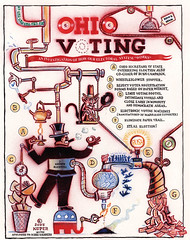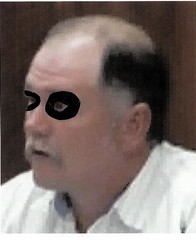Solicitor David Kuhn
Councilman Tim Loper

Ohio proudly calls itself the Buckeye State, but since 2000 Ohio has gained another more shameful reputation. As a result of widespread election fraud, Ohio now could be called the Blackeye State.
The electoral blackeye given to Ohio at the state level by Secretary of State Kenneth Blackwell and in Portsmouth by City Solicitor David Kuhn is not going to be improved by the Loper case, which I have written about before but which I have to write about again because it gets more convoluted and unbelievable with each passing week.
On April 28, 2006, Portsmouth Daily Times reporter Jeff Barron wrote, “Just when it looked like the residency status of Portsmouth City Councilman Tim Loper couldn't get any more confusing, it did.” Loper’s status is confusing only because City Solicitor David Kuhn, who has been advising Loper at every stage, has made it confusing, either because he can not understand the city charter and the state statutes, or because he is willfully misinterpreting them. With Kuhn, the question is whether he is more ethically or more intellectually challenged.
Timothy Loper and his wife Teresa were residents of Ward One in Portsmouth, where they lived for a number of years at 114 Madison St. A high school dropout, Loper made a sporadic living as a laborer. He had trouble paying bills and creditors brought him into court more than once. He also had a record of arrests for driving under the influence, for which he received a suspended jail sentence. In an interview with me in 2004, he complained about the lack of job opportunities in Portsmouth and about the city’s purchase of the Marting building.
Prior to 2004, Loper had no experience in politics. But in that year, prompted by the Marting scandal, or by his realization that an opportunity to get ahead had finally presented itself, he became involved in the recall movement. The city in 2002 had purchased the empty Marting’s department store from the Marting Foundation for almost $2 million, a sale that was later ruled invalid by Common Pleas judge Marshall. One of the city officials responsible for the purchase of the Marting building was city council woman Ann Sydnor, who represented Ward One. In June 2004, Loper ran against her in a special recall election and won by a slim margin. Feelings against her and other city officials ran high in Portsmouth. Almost immediately after being elected to the city council, Loper, the former reform candidate, turned into a supporter of the status quo. He supported repurchasing the Marting building and converting it into a new city building. On Marting’s and other issues, Loper showed he was in the pocket of the powers-that-be and that his running as a reformer had simply been the most convenient way to put himself in a position to sell himself to the over-privileged, who control the city.
But he did not know how to close the sale. Just because someone is willing to sell his soul at a devil's auction doesn’t mean the devil knows about all his debts. Even after he was elected, Loper’s finances were going from bad to worse. As a result of unpaid taxes and a failure to keep up with mortgage payments on his Madison St. house, a sheriff’s auction was held on August 17, 2004. Although Loper would later claim he moved out of Ward One in October, according to eye witnesses, neighbors, and sheriff’s records, 114 Madison was unoccupied the day it was sold, August 17, so just where Loper was living in Ward One until October he has not made clear. But even if he lived in Ward One until October, he moved out before the November 8, 2005 election.
At around the time Loper’s Madison St. house was sold at auction in August 2005, he and his wife moved to Pleasant St., in Ward Six. According to the city charter, when he moved to Ward Six, Loper lost his right to vote in Ward One. He not only lost his right to vote in Ward One, he also lost his right to continue to represent Ward One on the city council, because the charter states a councilman must live in the ward he represents.
 Furthermore, and most importantly, when Loper moved out of Ward One, he lost any legal right to run for the Ward One seat in the November 8, 2005, election. But City Solicitor David Kuhn failed to make it clear that Loper had lost his voting rights in Ward One; Kuhn failed to make it clear Loper could not continue to represent Ward One on the city council; and Kuhn failed to make it clear that Loper could not run for the Ward One seat in the November election. What Kuhn did instead was to advise Loper how he could continue to vote in Ward One, how he could continue to represent Ward One on the city council, and how he could run for Ward One seat in the November election. Kuhn based his bad advice on a misreading of a state statute that says if an elected official temporarily moves out of the district that elected him but intends to return to his primary residence, then that district remains his legal residence. But Loper did not maintain his primary residence; 114 Madison was sold in August 2005. His subsequent attempt to claim that 519 ½ Third St. was his primary residence was an obvious attempt to remain qualified to continue to vote and run for office in Ward One.
Furthermore, and most importantly, when Loper moved out of Ward One, he lost any legal right to run for the Ward One seat in the November 8, 2005, election. But City Solicitor David Kuhn failed to make it clear that Loper had lost his voting rights in Ward One; Kuhn failed to make it clear Loper could not continue to represent Ward One on the city council; and Kuhn failed to make it clear that Loper could not run for the Ward One seat in the November election. What Kuhn did instead was to advise Loper how he could continue to vote in Ward One, how he could continue to represent Ward One on the city council, and how he could run for Ward One seat in the November election. Kuhn based his bad advice on a misreading of a state statute that says if an elected official temporarily moves out of the district that elected him but intends to return to his primary residence, then that district remains his legal residence. But Loper did not maintain his primary residence; 114 Madison was sold in August 2005. His subsequent attempt to claim that 519 ½ Third St. was his primary residence was an obvious attempt to remain qualified to continue to vote and run for office in Ward One.
A Kuhn's Age
As was shown in his sworn testimony at the Board of Elections hearing, neither Loper or his wife had ever lived in 519 ½ Third St. Even if Loper divorces his wife and moves back to Ward One, at 519 ½ Third St. or elsewhere, that does not change the fact that he was not living in Ward One when he was elected to the city council in Nov. 2005. Moving back to Ward One in 2006 does not retroactively change Loper's status in the fall of 2005. That was then, this is now, and the two are not the same, not even in a Kuhn's age.
Moving back to Ward One in 2006 does not retroactively change Loper's status in the fall of 2005. That was then, this is now, and the two are not the same, not even in a Kuhn's age.
Loper claimed that he rented 519 ½ Third St. as his primary residence from ex-convict, Ted Journey, although Journey was later quoted as saying he rented 519 ½ to Loper as an office, not a residence. Kuhn conducted an investigation, talked to Ted Journey (before Journey was arrested yet again, for running a one-stop chop and drug shop in Ward One) and concluded that 519 ½ Third was Loper’s legal residence. Kuhn continued to insist 519 ½ Third was Loper’s legal residence even after the Scioto County Board of Elections, which is made up of Democratic and Republican members, voted unanimously recently that Loper had lost his voting rights in Ward One when he moved to Ward Six.
 On a couple of occasions, Loper has shown signs of common sense. After the Board of Election’s ruled against him, he came up to me afterwards and shook my hand, thanking me for filing my challenge. He seemed relieved that he no longer had to go on pretending that 519 ½ Third was his legal residence. His wife was probably even happier. He said after the Board hearing that he thinks his election in 2005 was invalid and should be held again. He would like to run again, presumably without Kuhn’s bad advice. But Kuhn continues to advise Loper badly and has persuaded him to continue maintaining the lie that 519 ½ Third is where he lives even though he is living with his wife in Ward Six. Kuhn has turned Loper’s personal as well as his political life into a farce. He has made a fool of Loper, which unfortunately is not too hard to do. Loper’s most recent claim that he is separated from his wife politically but not romantically, that she lives in Ward Six but that he lives in Ward One is like that Abbott and Costello routine, only it’s which Loper lives politically in Ward One and which Loper lives romantically in Ward Six?
On a couple of occasions, Loper has shown signs of common sense. After the Board of Election’s ruled against him, he came up to me afterwards and shook my hand, thanking me for filing my challenge. He seemed relieved that he no longer had to go on pretending that 519 ½ Third was his legal residence. His wife was probably even happier. He said after the Board hearing that he thinks his election in 2005 was invalid and should be held again. He would like to run again, presumably without Kuhn’s bad advice. But Kuhn continues to advise Loper badly and has persuaded him to continue maintaining the lie that 519 ½ Third is where he lives even though he is living with his wife in Ward Six. Kuhn has turned Loper’s personal as well as his political life into a farce. He has made a fool of Loper, which unfortunately is not too hard to do. Loper’s most recent claim that he is separated from his wife politically but not romantically, that she lives in Ward Six but that he lives in Ward One is like that Abbott and Costello routine, only it’s which Loper lives politically in Ward One and which Loper lives romantically in Ward Six?
Perhaps Loper readily allows himself to be manipulated by Kuhn because someone is now willing to assist him financially with renovating 519 Third St., which continues to be owned by the indicted Journey. Loper appears finally to be getting a payoff for his selling out, but just who is going to collect it? Journey's 519 Third St. house is turning into a money pit, but where is the money coming from and into whose pockets is it going?
 Kuhn’s wrongheaded insistence that Loper legally holds Ward One residency has confounded observers, who cannot believe the city solicitor can be so dense. It is not so much that Kuhn is dense; it is that he is desperate, desperate because what the decision by Scioto County Board of Elections effectively means is not just that Loper had no right to vote in Ward One on Nov. 8, 2005: he also had no right to run for city council from Ward One on Nov. 8, 2005. When the courts eventually rule that the election for city council in Ward One in 2005 was invalid, Kuhn will be exposed as the incompetent and unethical city solicitor that many of us in Ward One have unhappily discovered him to be. What Kuhn and Loper have given Portsmouth and Ohio is not one, not two, but four black eyes. That's what happens in a Kuhn's Age.
Kuhn’s wrongheaded insistence that Loper legally holds Ward One residency has confounded observers, who cannot believe the city solicitor can be so dense. It is not so much that Kuhn is dense; it is that he is desperate, desperate because what the decision by Scioto County Board of Elections effectively means is not just that Loper had no right to vote in Ward One on Nov. 8, 2005: he also had no right to run for city council from Ward One on Nov. 8, 2005. When the courts eventually rule that the election for city council in Ward One in 2005 was invalid, Kuhn will be exposed as the incompetent and unethical city solicitor that many of us in Ward One have unhappily discovered him to be. What Kuhn and Loper have given Portsmouth and Ohio is not one, not two, but four black eyes. That's what happens in a Kuhn's Age.


 Furthermore, and most importantly, when Loper moved out of Ward One, he lost any legal right to run for the Ward One seat in the
Furthermore, and most importantly, when Loper moved out of Ward One, he lost any legal right to run for the Ward One seat in the  Moving back to Ward One in 2006 does not retroactively change Loper's status in the fall of 2005. That was then, this is now, and the two are not the same, not even in a Kuhn's age.
Moving back to Ward One in 2006 does not retroactively change Loper's status in the fall of 2005. That was then, this is now, and the two are not the same, not even in a Kuhn's age. On a couple of occasions, Loper has shown signs of common sense. After the Board of Election’s ruled against him, he came up to me afterwards and shook my hand, thanking me for filing my challenge. He seemed relieved that he no longer had to go on pretending that 519 ½ Third was his legal residence. His wife was probably even happier. He said after the Board hearing that he thinks his election in 2005 was invalid and should be held again. He would like to run again, presumably without Kuhn’s bad advice. But Kuhn continues to advise Loper badly and has persuaded him to continue maintaining the lie that 519 ½ Third is where he lives even though he is living with his wife in Ward Six. Kuhn has turned Loper’s personal as well as his political life into a farce. He has made a fool of Loper, which unfortunately is not too hard to do. Loper’s most recent claim that he is separated from his wife politically but not romantically, that she lives in Ward Six but that he lives in Ward One is like that Abbott and Costello routine, only it’s which Loper lives politically in Ward One and which Loper lives romantically in Ward Six?
On a couple of occasions, Loper has shown signs of common sense. After the Board of Election’s ruled against him, he came up to me afterwards and shook my hand, thanking me for filing my challenge. He seemed relieved that he no longer had to go on pretending that 519 ½ Third was his legal residence. His wife was probably even happier. He said after the Board hearing that he thinks his election in 2005 was invalid and should be held again. He would like to run again, presumably without Kuhn’s bad advice. But Kuhn continues to advise Loper badly and has persuaded him to continue maintaining the lie that 519 ½ Third is where he lives even though he is living with his wife in Ward Six. Kuhn has turned Loper’s personal as well as his political life into a farce. He has made a fool of Loper, which unfortunately is not too hard to do. Loper’s most recent claim that he is separated from his wife politically but not romantically, that she lives in Ward Six but that he lives in Ward One is like that Abbott and Costello routine, only it’s which Loper lives politically in Ward One and which Loper lives romantically in Ward Six? Kuhn’s wrongheaded insistence that Loper legally holds Ward One residency has confounded observers, who cannot believe the city solicitor can be so dense. It is not so much that Kuhn is dense; it is that he is desperate, desperate because what the decision by Scioto County Board of Elections effectively means is not just that Loper had no right to vote in Ward One on Nov. 8, 2005: he also had no right to run for city council from Ward One on Nov. 8, 2005. When the courts eventually rule that the election for city council in Ward One in 2005 was invalid, Kuhn will be exposed as the incompetent and unethical city solicitor that many of us in Ward One have unhappily discovered him to be. What Kuhn and Loper have given
Kuhn’s wrongheaded insistence that Loper legally holds Ward One residency has confounded observers, who cannot believe the city solicitor can be so dense. It is not so much that Kuhn is dense; it is that he is desperate, desperate because what the decision by Scioto County Board of Elections effectively means is not just that Loper had no right to vote in Ward One on Nov. 8, 2005: he also had no right to run for city council from Ward One on Nov. 8, 2005. When the courts eventually rule that the election for city council in Ward One in 2005 was invalid, Kuhn will be exposed as the incompetent and unethical city solicitor that many of us in Ward One have unhappily discovered him to be. What Kuhn and Loper have given